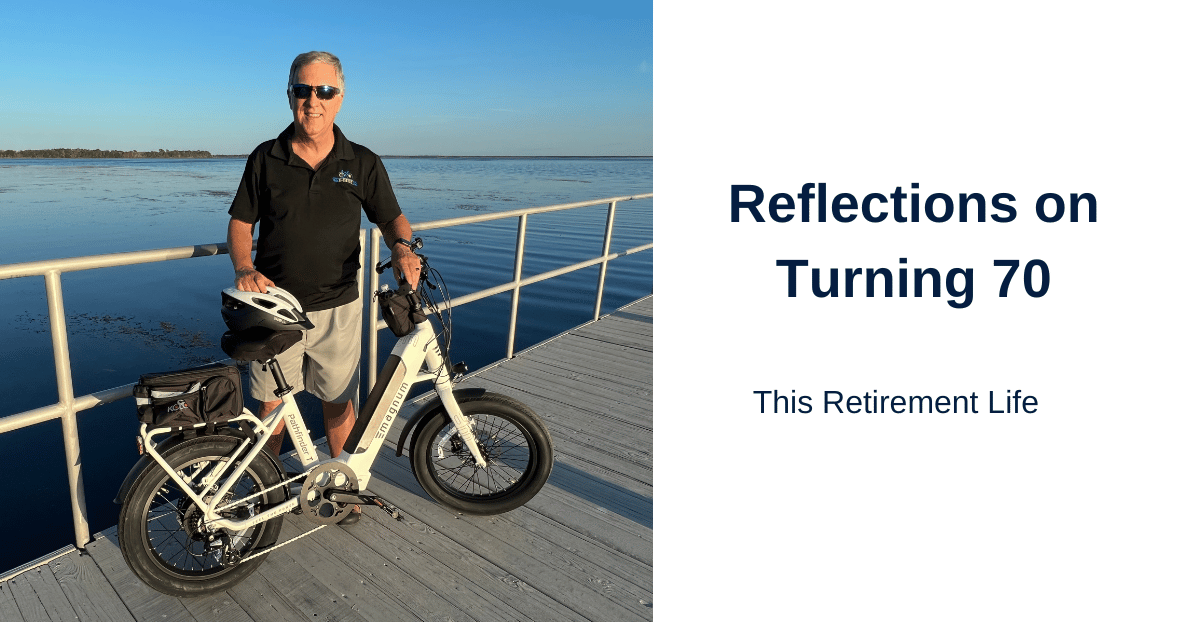Aging into a new decade of life is always a bit unnerving. Do you remember when turning 30 was so traumatic? It seemed like the beginning of the end. We were no longer young.
I recently turned 70, another decade marker that many of us Baby Boomers have passed or will soon. Turning 70 isn’t what I expected. I still don’t feel any older. What exactly is old age anyway? As I get older, I keep pushing further out the time of life when in my mind one becomes “elderly.” I don’t feel like I am there yet, at least not on most days.
Here are some of my random observations about this milestone marker of turning 70.
Whatever Happened to Retirement?
Throughout most of my working years, I saved money and looked forward to that great day when I could finally retire. I’m sure at age 40 or 50 I was hoping to retire as soon as possible. Now at age 70, the dream of retiring someday looks different. Like many of my peers, I’m still working, and that’s OK. Fortunately for me, it’s not about the money. Rather, I enjoy my work and still feel I have something more to contribute.
Everyone has a different attitude about retirement. If you get satisfaction from playing golf every day, then retire and enjoy it. That’s not how I’m wired. I need the intellectual challenge and social engagement that comes through work. I need to feel I’m making a difference.
Hobbies and sports are fulfilling enough for some senior adults, but not for others. I’m a bicycling (e-bike) enthusiast. I love being on my bike, but the idea of retiring so I can spend the majority of my time every day cycling doesn’t appeal to me. I need something more.
What I have come to better appreciate is that there is no “right” age to retire. Nor should we feel sorry for someone who works until their last days. That may be exactly what they wanted. It’s not uncommon these days to find people age 75, 80, or beyond still working. For some, it’s a financial necessity, but for others it’s a choice. For many, it’s both. It’s what makes them happy.
Read more about why Boomers are postponing retirement or going back to work in this story from This Retirement Life.
Hello Social Security
Despite the benefits of waiting until age 70 to begin receiving Social Security income, few people do so. In fact, only about six percent of people wait until age 70, the age at which you can draw the largest-possible monthly retirement check.
That number includes me. I received my first Social Security retirement check based on my own work history this month. By choosing to wait until age 70, I will receive 32 percent more per month in benefits than if I had begun benefits at age 66. Further, if I pass away before my wife does, she will continue to receive my larger Social Security check for the rest of her life.
For most people, it makes financial sense to wait as long as possible to start Social Security. If you can, at least hold out until your full retirement age (age 66 to 67 for most Boomers) rather than at 62, the earliest possible age to begin drawing these benefits. Better yet, wait until 70 like I am doing, especially if you’re in reasonably good health and still working or have other sources of retirement income.
Like in the discussion above about when to retire, there is no “one size fits all” answer to what age is the “right” age to start earning Social Security. If you work a manual labor job that is breaking down your body and spirit as you age, then retiring earlier and starting Social Security may be the right answer for you. If your health is poor and it’s unlikely you will live many more years, then by all means start drawing Social Security sooner rather than later. Still, these scenarios don’t describe most of us. For the majority of us, it pays to wait.
For more information about waiting until age 70 to start Social Security and other key numbers to know for retiring, see this related story from This Retirement Life.
Travel is More Challenging – and Expensive
Like many senior adults, I am at long last finally able to consider taking extended vacations to far-away places. When the kids were still at home and the wife and I were working hard to keep them fed and clothed, spending money on exotic travel wasn’t a serious option.
As we reach retirement age, travel becomes a higher priority. Unfortunately, what I’m discovering is that travel is both extremely expensive and physically more difficult now due to age and health issues.
Whether your dream vacation is riding the trains in Canada, river cruising in Europe, or taking the family to Disney World, travel these days can cost a fortune. During your first few years of retirement, you could easily spend as much on travel as the cost of your child’s college education.
It’s too bad we have neither the time nor money to travel more while we’re relatively young and healthy. As we age, health limitations can put a damper on travel plans. My wife and I can’t walk as far as we did even a decade ago. I have issues with fatigue and shortness of breath related to some underlying health problems. Kathy has artificial knees; I’m overdue for a hip replacement. We’re still very blessed and consider ourselves to be in reasonably good health, but even so, these ailments make travel more tiring.
We still plan to travel, but as we age we realize we may be forced to scale back some of our more ambitious dream vacations, both due to financial reasons and the effects of aging.
Kathy and I are not quite to the senior bus tour time of life yet, but it’s coming soon. I hear they are lots of fun.
The Benefits of Staying Active
Everyone ages differently, and at a different pace. Aging is inevitable, but there are ways to fight back and slow down the aging clock. Staying active is our best defense against a myriad of ailments and can help us maintain our independence. Strength training is probably the most overlooked activity that all of us should be pursuing on a regular basis. We’re going to lose muscular strength as we age but strength training can help us stay fit enough to perform daily tasks independently. Cardiovascular fitness can be maintained through fun and social activities such as walking or bicycling; or swimming for those who have that skill and a good place to swim year-round.
Scientific studies confirm that exercise not only improves our physical health but also keeps us more mentally alert. It can slow down aging. I go into greater detail about this in my book about cycling, titled E-Bikes – Putting the FUN Back into Cycling (and Life) at any Age. Walking and cycling are two exercises that most seniors can continue doing late in life. The introduction of electric-assist bikes makes cycling possible for a much broader group of seniors.
Is walking your exercise of choice? Read this story on This Retirement Life for some inspiration from other seniors.
Life is Finite
Thanks to modern healthcare and improved living conditions, many of us will live longer than we think, probably longer than our parents did. It’s not uncommon these days to find folks in their 90s who are still healthy enough to live independently and enjoy life.
Even so, as we age, we’re reminded that life is finite. We don’t get to stay here indefinitely, and for sure, most of our life on this Earth is behind us now. Turning 70 reminds me that even in a best-case scenario I won’t have many more decade markers like this one.
By this age, most of us have had at least one significant health issue. Maybe it’s cancer, heart disease, high blood pressure, mobility issues, breathing difficulties, strokes, Parkinson’s, or diabetes. Whatever it is, it’s a wake-up call that we’re no longer young and invincible.
Realizing that time (and good health, if we’re fortunate enough to still have it) are fleeting, many of us are becoming more purpose-driven and razor-focused on what really matters. Material stuff fades in significance. A larger house filled with new furniture is no longer on my priority list. How about you?
Aging Baby Boomers are more concerned about how we can be a positive influence on the younger people in our lives and the legacy we will leave to them. Our grandchildren, and great-grandchildren for those so blessed, are now a high priority. Most of us would rather give money away to charitable causes we support than to spend it on more personal luxuries.
Turning 70 reminds me that life is finite, but I think most of us Boomers are at peace with that. Every generation has its difficulties, but overall our generation has been extremely blessed. We’ve enjoyed a level of prosperity and good health that exceeds that of any past generation. Most of us can say it’s been a good life.
Roll Back the Clock? No Thanks!
Wouldn’t it be great to have the youthful body of a healthy 20 or 30-year-old again? Of course it would, but not if it means having to start the game of life over again. The working years are hard years. Getting a career launched. Raising a family. Building a nest egg. Been there, done that. At this stage of life, I wouldn’t want to roll back the clock and do it all again. No thanks!
Every period of life has its beauty and meaning. The senior years, at least as long as our health holds up, in many ways is the best time of life. They aren’t called the Golden Years without reason. We (hopefully) have fewer financial worries. We have more free time. We can pursue our interests and dreams. We’re far wiser and less stressed.
Turning 70 is OK so far. We’re blessed to be alive. God is good. Let’s enjoy each day and make the most of it.
Love this story? Sign up below to receive future blog post from This Retirement Life, sent to your email box, free of charge, AND receive a copy of our NEW chart comparing the Top 20 Retirement States. This chart is only available to subscribers.
Do you have comments to share about this story? We’d love to hear from you. Scroll down to add your comments below.









Welcome to age 70! On my 60th BD a mentor years older than I gave me the motto “Peak at 80.” He also said the years after full-time work would be the most fulfilling of any. Now at 82, I see the wisdom in his counsel. The Peak at 80 mindset helped me enjoy almost full-time consulting until 81. Then it felt like — aging! So while still of sound mind, I made ten decisions that are helping my new perspective, e.g., let professionals manage our investments, stop flying for any further consulting, write very specific suggestions and requests to supplement our living trust, spend more time on my spiritual life, reduce the newsfeeds sapping too many hours, etc. All that has helped me live in peace and health into my 83rd year of life. Yes, God is good.